BSc Business Management - LSME505: Market Failure Case Study Analysis
VerifiedAdded on 2022/11/29
|10
|2617
|448
Case Study
AI Summary
This case study delves into the complexities of market failure within the UK business environment, examining its multifaceted impacts on entrepreneurship, labor markets, and the availability of financial resources. It highlights the role of information asymmetry, externalities, and public goods in contributing to market inefficiencies, particularly within the context of the tobacco industry. The analysis further explores the consequences of these failures, including reduced workforce productivity, unemployment, and misallocation of financial resources. The study then investigates the UK government's economic policies, such as price cap regulations and taxation, and how these measures shape business strategies and decision-making processes. It also assesses the challenges and implications of these policies on various business aspects, including pricing, innovation, and wage determination, providing a comprehensive understanding of the interplay between market dynamics and governmental interventions.
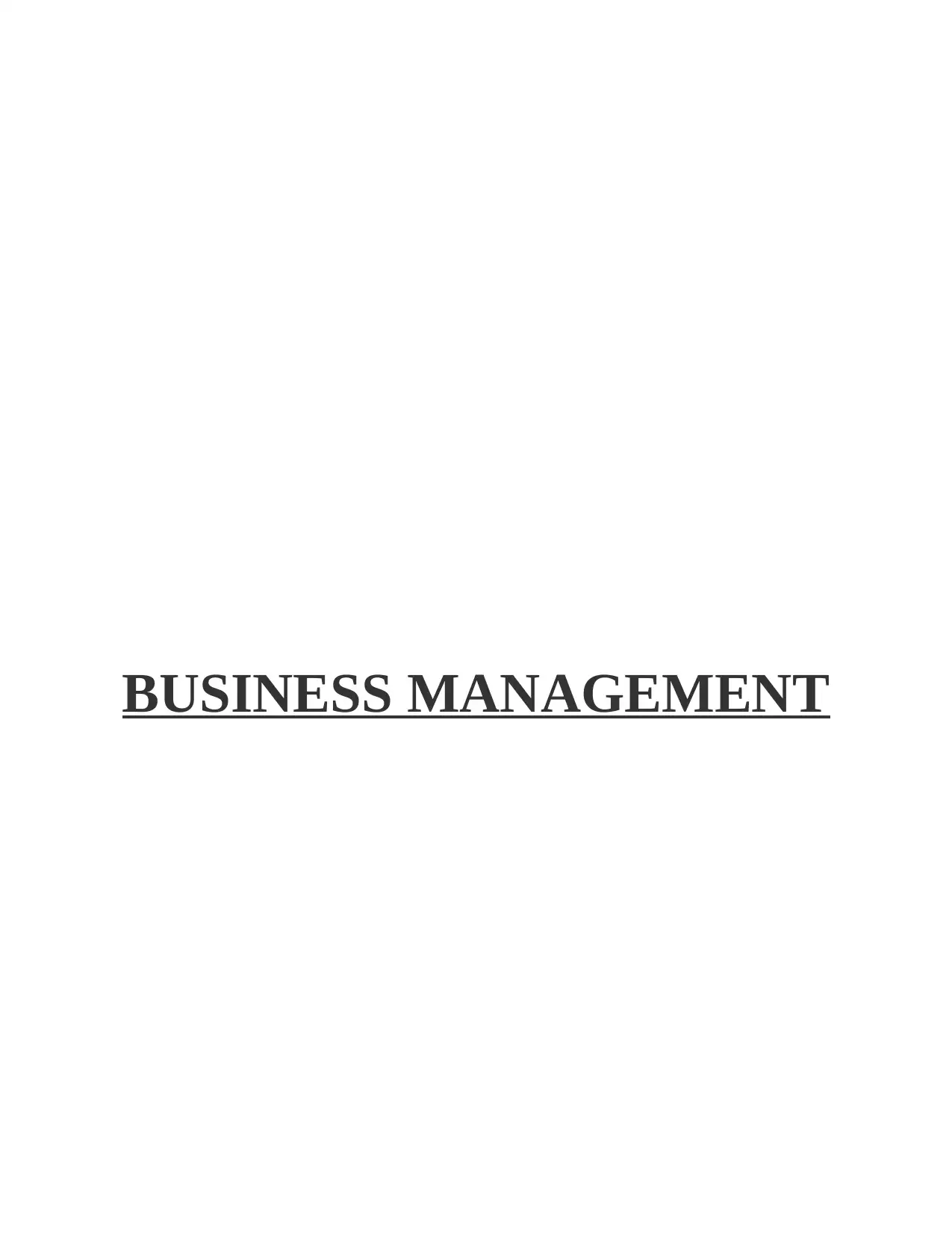
BUSINESS MANAGEMENT
Paraphrase This Document
Need a fresh take? Get an instant paraphrase of this document with our AI Paraphraser
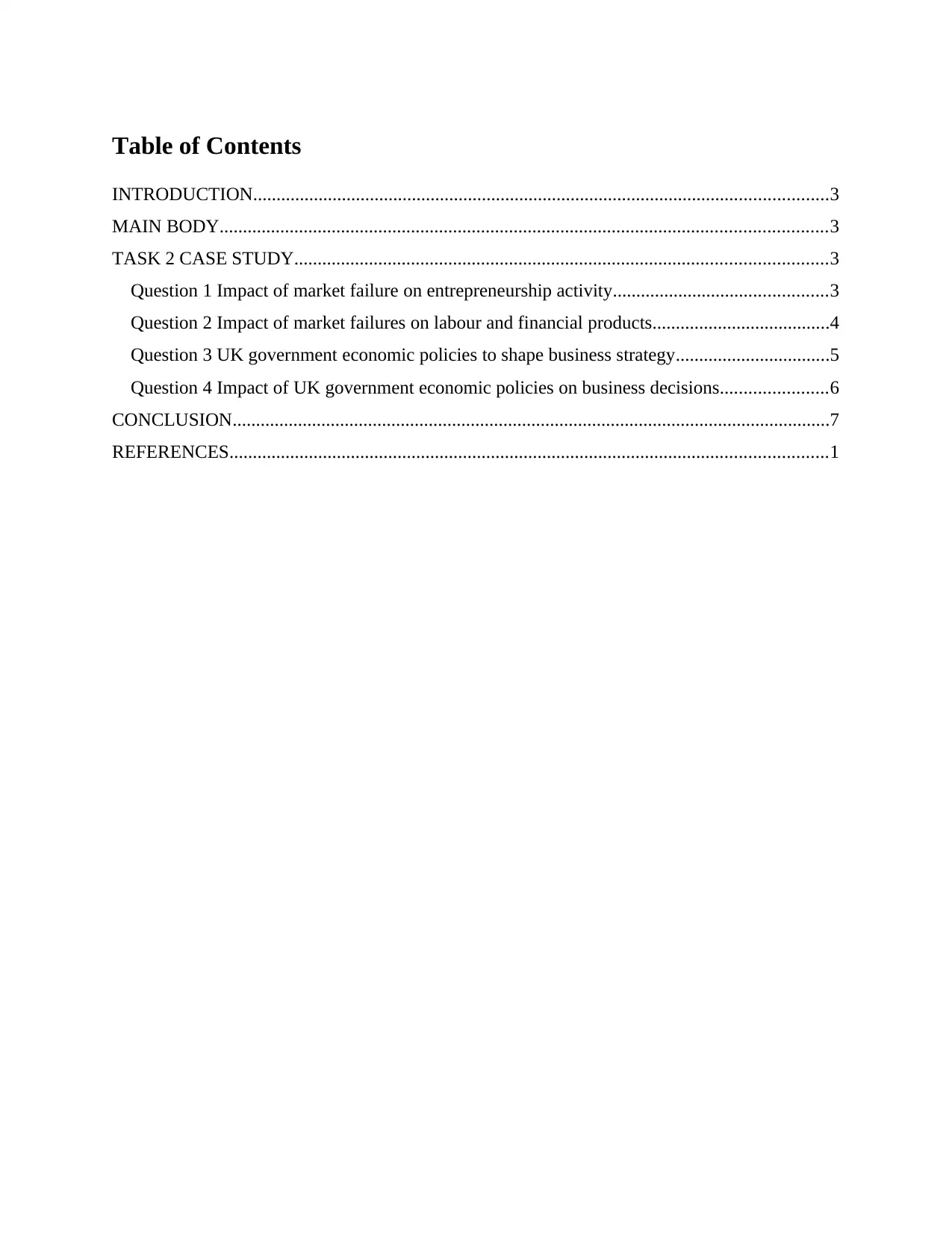
Table of Contents
INTRODUCTION...........................................................................................................................3
MAIN BODY..................................................................................................................................3
TASK 2 CASE STUDY..................................................................................................................3
Question 1 Impact of market failure on entrepreneurship activity..............................................3
Question 2 Impact of market failures on labour and financial products......................................4
Question 3 UK government economic policies to shape business strategy.................................5
Question 4 Impact of UK government economic policies on business decisions.......................6
CONCLUSION................................................................................................................................7
REFERENCES................................................................................................................................1
INTRODUCTION...........................................................................................................................3
MAIN BODY..................................................................................................................................3
TASK 2 CASE STUDY..................................................................................................................3
Question 1 Impact of market failure on entrepreneurship activity..............................................3
Question 2 Impact of market failures on labour and financial products......................................4
Question 3 UK government economic policies to shape business strategy.................................5
Question 4 Impact of UK government economic policies on business decisions.......................6
CONCLUSION................................................................................................................................7
REFERENCES................................................................................................................................1
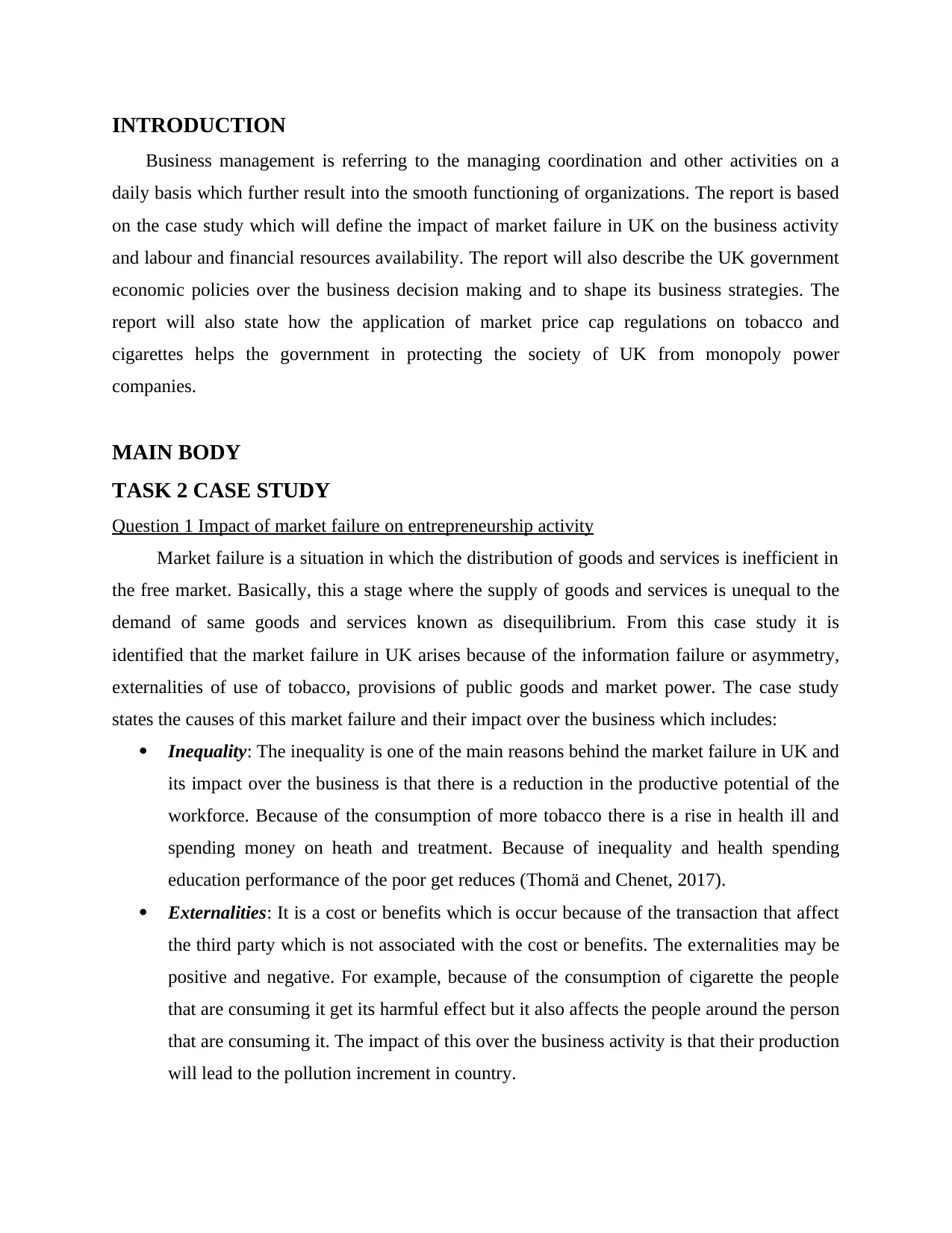
INTRODUCTION
Business management is referring to the managing coordination and other activities on a
daily basis which further result into the smooth functioning of organizations. The report is based
on the case study which will define the impact of market failure in UK on the business activity
and labour and financial resources availability. The report will also describe the UK government
economic policies over the business decision making and to shape its business strategies. The
report will also state how the application of market price cap regulations on tobacco and
cigarettes helps the government in protecting the society of UK from monopoly power
companies.
MAIN BODY
TASK 2 CASE STUDY
Question 1 Impact of market failure on entrepreneurship activity
Market failure is a situation in which the distribution of goods and services is inefficient in
the free market. Basically, this a stage where the supply of goods and services is unequal to the
demand of same goods and services known as disequilibrium. From this case study it is
identified that the market failure in UK arises because of the information failure or asymmetry,
externalities of use of tobacco, provisions of public goods and market power. The case study
states the causes of this market failure and their impact over the business which includes:
Inequality: The inequality is one of the main reasons behind the market failure in UK and
its impact over the business is that there is a reduction in the productive potential of the
workforce. Because of the consumption of more tobacco there is a rise in health ill and
spending money on heath and treatment. Because of inequality and health spending
education performance of the poor get reduces (Thomä and Chenet, 2017).
Externalities: It is a cost or benefits which is occur because of the transaction that affect
the third party which is not associated with the cost or benefits. The externalities may be
positive and negative. For example, because of the consumption of cigarette the people
that are consuming it get its harmful effect but it also affects the people around the person
that are consuming it. The impact of this over the business activity is that their production
will lead to the pollution increment in country.
Business management is referring to the managing coordination and other activities on a
daily basis which further result into the smooth functioning of organizations. The report is based
on the case study which will define the impact of market failure in UK on the business activity
and labour and financial resources availability. The report will also describe the UK government
economic policies over the business decision making and to shape its business strategies. The
report will also state how the application of market price cap regulations on tobacco and
cigarettes helps the government in protecting the society of UK from monopoly power
companies.
MAIN BODY
TASK 2 CASE STUDY
Question 1 Impact of market failure on entrepreneurship activity
Market failure is a situation in which the distribution of goods and services is inefficient in
the free market. Basically, this a stage where the supply of goods and services is unequal to the
demand of same goods and services known as disequilibrium. From this case study it is
identified that the market failure in UK arises because of the information failure or asymmetry,
externalities of use of tobacco, provisions of public goods and market power. The case study
states the causes of this market failure and their impact over the business which includes:
Inequality: The inequality is one of the main reasons behind the market failure in UK and
its impact over the business is that there is a reduction in the productive potential of the
workforce. Because of the consumption of more tobacco there is a rise in health ill and
spending money on heath and treatment. Because of inequality and health spending
education performance of the poor get reduces (Thomä and Chenet, 2017).
Externalities: It is a cost or benefits which is occur because of the transaction that affect
the third party which is not associated with the cost or benefits. The externalities may be
positive and negative. For example, because of the consumption of cigarette the people
that are consuming it get its harmful effect but it also affects the people around the person
that are consuming it. The impact of this over the business activity is that their production
will lead to the pollution increment in country.
⊘ This is a preview!⊘
Do you want full access?
Subscribe today to unlock all pages.

Trusted by 1+ million students worldwide
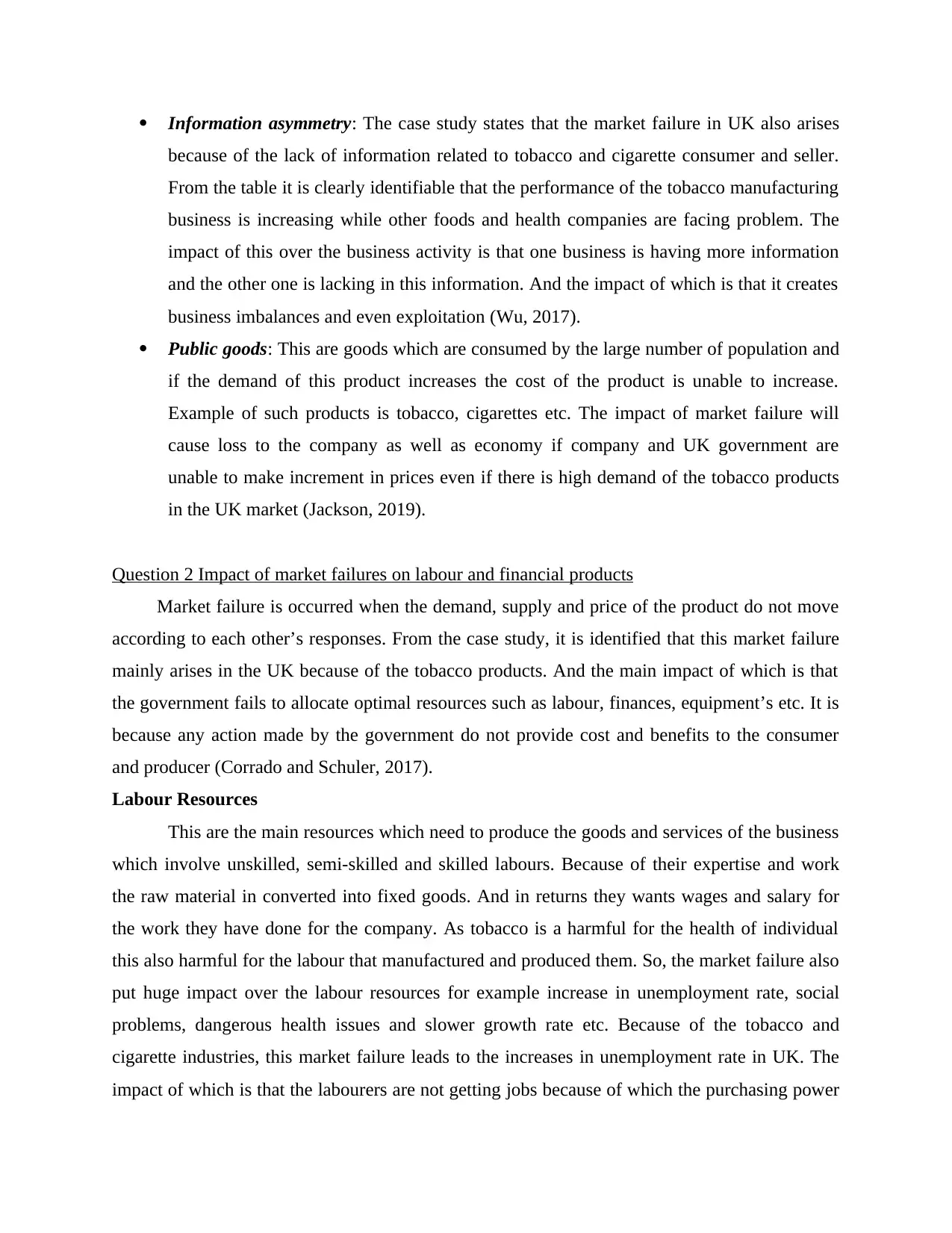
Information asymmetry: The case study states that the market failure in UK also arises
because of the lack of information related to tobacco and cigarette consumer and seller.
From the table it is clearly identifiable that the performance of the tobacco manufacturing
business is increasing while other foods and health companies are facing problem. The
impact of this over the business activity is that one business is having more information
and the other one is lacking in this information. And the impact of which is that it creates
business imbalances and even exploitation (Wu, 2017).
Public goods: This are goods which are consumed by the large number of population and
if the demand of this product increases the cost of the product is unable to increase.
Example of such products is tobacco, cigarettes etc. The impact of market failure will
cause loss to the company as well as economy if company and UK government are
unable to make increment in prices even if there is high demand of the tobacco products
in the UK market (Jackson, 2019).
Question 2 Impact of market failures on labour and financial products
Market failure is occurred when the demand, supply and price of the product do not move
according to each other’s responses. From the case study, it is identified that this market failure
mainly arises in the UK because of the tobacco products. And the main impact of which is that
the government fails to allocate optimal resources such as labour, finances, equipment’s etc. It is
because any action made by the government do not provide cost and benefits to the consumer
and producer (Corrado and Schuler, 2017).
Labour Resources
This are the main resources which need to produce the goods and services of the business
which involve unskilled, semi-skilled and skilled labours. Because of their expertise and work
the raw material in converted into fixed goods. And in returns they wants wages and salary for
the work they have done for the company. As tobacco is a harmful for the health of individual
this also harmful for the labour that manufactured and produced them. So, the market failure also
put huge impact over the labour resources for example increase in unemployment rate, social
problems, dangerous health issues and slower growth rate etc. Because of the tobacco and
cigarette industries, this market failure leads to the increases in unemployment rate in UK. The
impact of which is that the labourers are not getting jobs because of which the purchasing power
because of the lack of information related to tobacco and cigarette consumer and seller.
From the table it is clearly identifiable that the performance of the tobacco manufacturing
business is increasing while other foods and health companies are facing problem. The
impact of this over the business activity is that one business is having more information
and the other one is lacking in this information. And the impact of which is that it creates
business imbalances and even exploitation (Wu, 2017).
Public goods: This are goods which are consumed by the large number of population and
if the demand of this product increases the cost of the product is unable to increase.
Example of such products is tobacco, cigarettes etc. The impact of market failure will
cause loss to the company as well as economy if company and UK government are
unable to make increment in prices even if there is high demand of the tobacco products
in the UK market (Jackson, 2019).
Question 2 Impact of market failures on labour and financial products
Market failure is occurred when the demand, supply and price of the product do not move
according to each other’s responses. From the case study, it is identified that this market failure
mainly arises in the UK because of the tobacco products. And the main impact of which is that
the government fails to allocate optimal resources such as labour, finances, equipment’s etc. It is
because any action made by the government do not provide cost and benefits to the consumer
and producer (Corrado and Schuler, 2017).
Labour Resources
This are the main resources which need to produce the goods and services of the business
which involve unskilled, semi-skilled and skilled labours. Because of their expertise and work
the raw material in converted into fixed goods. And in returns they wants wages and salary for
the work they have done for the company. As tobacco is a harmful for the health of individual
this also harmful for the labour that manufactured and produced them. So, the market failure also
put huge impact over the labour resources for example increase in unemployment rate, social
problems, dangerous health issues and slower growth rate etc. Because of the tobacco and
cigarette industries, this market failure leads to the increases in unemployment rate in UK. The
impact of which is that the labourers are not getting jobs because of which the purchasing power
Paraphrase This Document
Need a fresh take? Get an instant paraphrase of this document with our AI Paraphraser
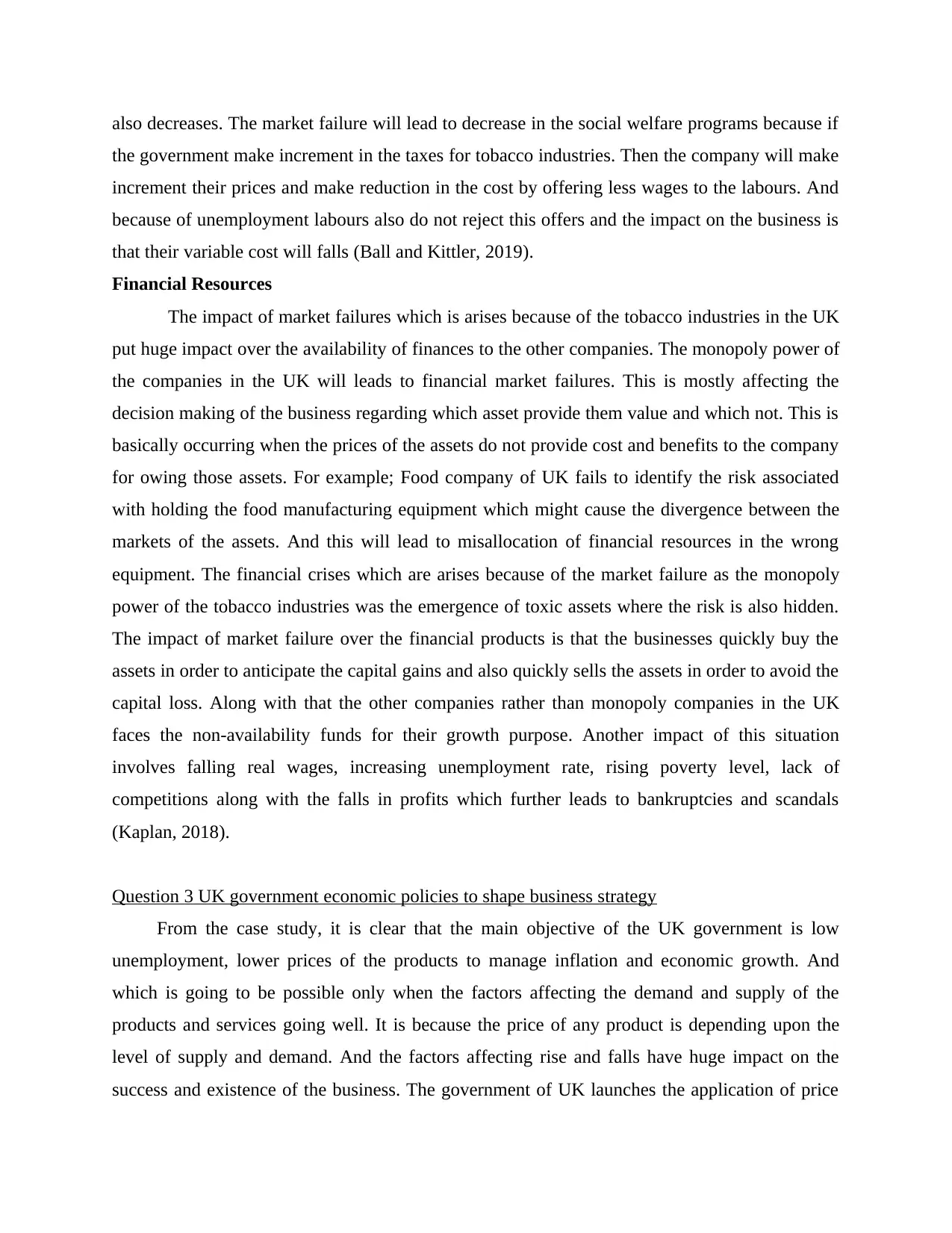
also decreases. The market failure will lead to decrease in the social welfare programs because if
the government make increment in the taxes for tobacco industries. Then the company will make
increment their prices and make reduction in the cost by offering less wages to the labours. And
because of unemployment labours also do not reject this offers and the impact on the business is
that their variable cost will falls (Ball and Kittler, 2019).
Financial Resources
The impact of market failures which is arises because of the tobacco industries in the UK
put huge impact over the availability of finances to the other companies. The monopoly power of
the companies in the UK will leads to financial market failures. This is mostly affecting the
decision making of the business regarding which asset provide them value and which not. This is
basically occurring when the prices of the assets do not provide cost and benefits to the company
for owing those assets. For example; Food company of UK fails to identify the risk associated
with holding the food manufacturing equipment which might cause the divergence between the
markets of the assets. And this will lead to misallocation of financial resources in the wrong
equipment. The financial crises which are arises because of the market failure as the monopoly
power of the tobacco industries was the emergence of toxic assets where the risk is also hidden.
The impact of market failure over the financial products is that the businesses quickly buy the
assets in order to anticipate the capital gains and also quickly sells the assets in order to avoid the
capital loss. Along with that the other companies rather than monopoly companies in the UK
faces the non-availability funds for their growth purpose. Another impact of this situation
involves falling real wages, increasing unemployment rate, rising poverty level, lack of
competitions along with the falls in profits which further leads to bankruptcies and scandals
(Kaplan, 2018).
Question 3 UK government economic policies to shape business strategy
From the case study, it is clear that the main objective of the UK government is low
unemployment, lower prices of the products to manage inflation and economic growth. And
which is going to be possible only when the factors affecting the demand and supply of the
products and services going well. It is because the price of any product is depending upon the
level of supply and demand. And the factors affecting rise and falls have huge impact on the
success and existence of the business. The government of UK launches the application of price
the government make increment in the taxes for tobacco industries. Then the company will make
increment their prices and make reduction in the cost by offering less wages to the labours. And
because of unemployment labours also do not reject this offers and the impact on the business is
that their variable cost will falls (Ball and Kittler, 2019).
Financial Resources
The impact of market failures which is arises because of the tobacco industries in the UK
put huge impact over the availability of finances to the other companies. The monopoly power of
the companies in the UK will leads to financial market failures. This is mostly affecting the
decision making of the business regarding which asset provide them value and which not. This is
basically occurring when the prices of the assets do not provide cost and benefits to the company
for owing those assets. For example; Food company of UK fails to identify the risk associated
with holding the food manufacturing equipment which might cause the divergence between the
markets of the assets. And this will lead to misallocation of financial resources in the wrong
equipment. The financial crises which are arises because of the market failure as the monopoly
power of the tobacco industries was the emergence of toxic assets where the risk is also hidden.
The impact of market failure over the financial products is that the businesses quickly buy the
assets in order to anticipate the capital gains and also quickly sells the assets in order to avoid the
capital loss. Along with that the other companies rather than monopoly companies in the UK
faces the non-availability funds for their growth purpose. Another impact of this situation
involves falling real wages, increasing unemployment rate, rising poverty level, lack of
competitions along with the falls in profits which further leads to bankruptcies and scandals
(Kaplan, 2018).
Question 3 UK government economic policies to shape business strategy
From the case study, it is clear that the main objective of the UK government is low
unemployment, lower prices of the products to manage inflation and economic growth. And
which is going to be possible only when the factors affecting the demand and supply of the
products and services going well. It is because the price of any product is depending upon the
level of supply and demand. And the factors affecting rise and falls have huge impact on the
success and existence of the business. The government of UK launches the application of price
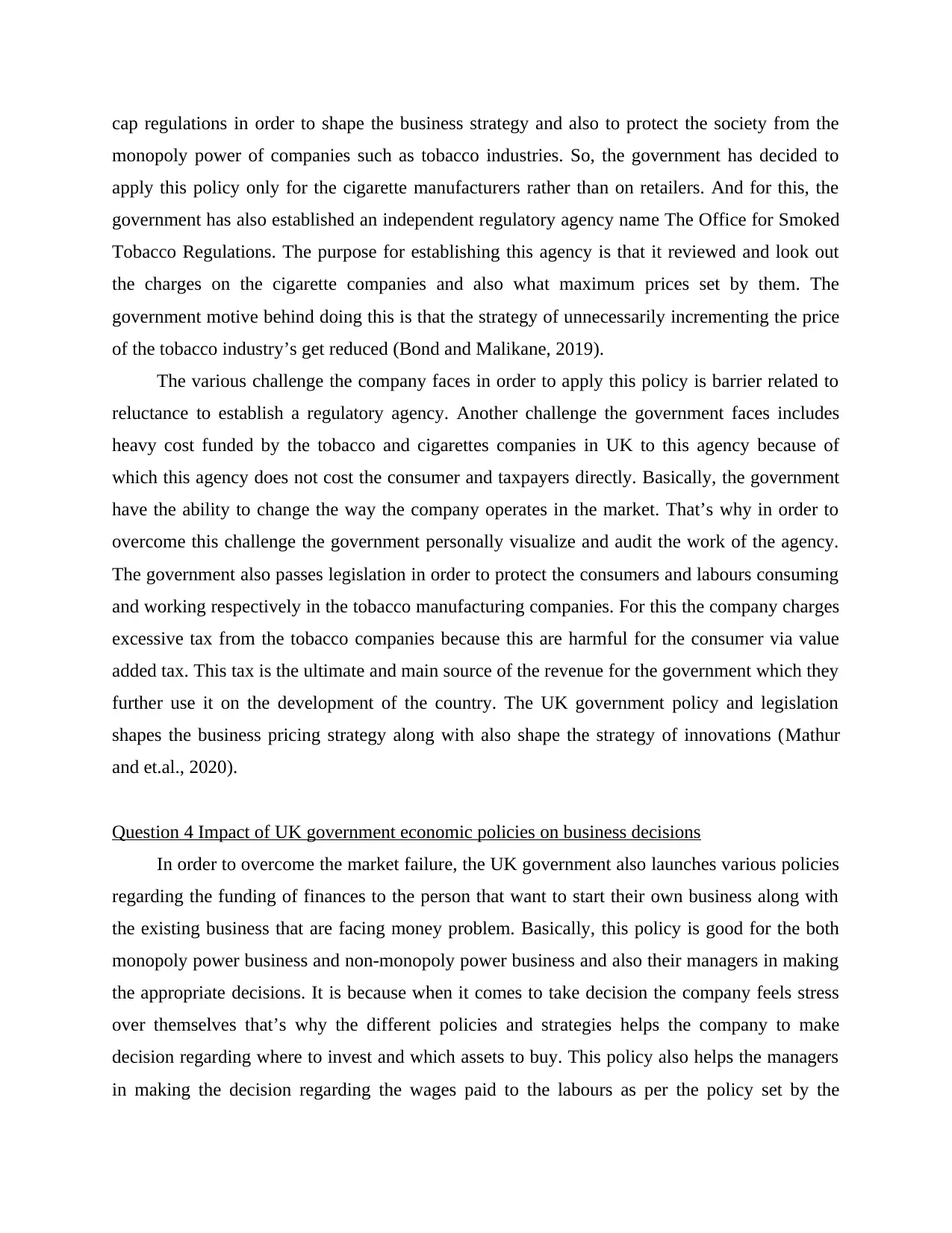
cap regulations in order to shape the business strategy and also to protect the society from the
monopoly power of companies such as tobacco industries. So, the government has decided to
apply this policy only for the cigarette manufacturers rather than on retailers. And for this, the
government has also established an independent regulatory agency name The Office for Smoked
Tobacco Regulations. The purpose for establishing this agency is that it reviewed and look out
the charges on the cigarette companies and also what maximum prices set by them. The
government motive behind doing this is that the strategy of unnecessarily incrementing the price
of the tobacco industry’s get reduced (Bond and Malikane, 2019).
The various challenge the company faces in order to apply this policy is barrier related to
reluctance to establish a regulatory agency. Another challenge the government faces includes
heavy cost funded by the tobacco and cigarettes companies in UK to this agency because of
which this agency does not cost the consumer and taxpayers directly. Basically, the government
have the ability to change the way the company operates in the market. That’s why in order to
overcome this challenge the government personally visualize and audit the work of the agency.
The government also passes legislation in order to protect the consumers and labours consuming
and working respectively in the tobacco manufacturing companies. For this the company charges
excessive tax from the tobacco companies because this are harmful for the consumer via value
added tax. This tax is the ultimate and main source of the revenue for the government which they
further use it on the development of the country. The UK government policy and legislation
shapes the business pricing strategy along with also shape the strategy of innovations (Mathur
and et.al., 2020).
Question 4 Impact of UK government economic policies on business decisions
In order to overcome the market failure, the UK government also launches various policies
regarding the funding of finances to the person that want to start their own business along with
the existing business that are facing money problem. Basically, this policy is good for the both
monopoly power business and non-monopoly power business and also their managers in making
the appropriate decisions. It is because when it comes to take decision the company feels stress
over themselves that’s why the different policies and strategies helps the company to make
decision regarding where to invest and which assets to buy. This policy also helps the managers
in making the decision regarding the wages paid to the labours as per the policy set by the
monopoly power of companies such as tobacco industries. So, the government has decided to
apply this policy only for the cigarette manufacturers rather than on retailers. And for this, the
government has also established an independent regulatory agency name The Office for Smoked
Tobacco Regulations. The purpose for establishing this agency is that it reviewed and look out
the charges on the cigarette companies and also what maximum prices set by them. The
government motive behind doing this is that the strategy of unnecessarily incrementing the price
of the tobacco industry’s get reduced (Bond and Malikane, 2019).
The various challenge the company faces in order to apply this policy is barrier related to
reluctance to establish a regulatory agency. Another challenge the government faces includes
heavy cost funded by the tobacco and cigarettes companies in UK to this agency because of
which this agency does not cost the consumer and taxpayers directly. Basically, the government
have the ability to change the way the company operates in the market. That’s why in order to
overcome this challenge the government personally visualize and audit the work of the agency.
The government also passes legislation in order to protect the consumers and labours consuming
and working respectively in the tobacco manufacturing companies. For this the company charges
excessive tax from the tobacco companies because this are harmful for the consumer via value
added tax. This tax is the ultimate and main source of the revenue for the government which they
further use it on the development of the country. The UK government policy and legislation
shapes the business pricing strategy along with also shape the strategy of innovations (Mathur
and et.al., 2020).
Question 4 Impact of UK government economic policies on business decisions
In order to overcome the market failure, the UK government also launches various policies
regarding the funding of finances to the person that want to start their own business along with
the existing business that are facing money problem. Basically, this policy is good for the both
monopoly power business and non-monopoly power business and also their managers in making
the appropriate decisions. It is because when it comes to take decision the company feels stress
over themselves that’s why the different policies and strategies helps the company to make
decision regarding where to invest and which assets to buy. This policy also helps the managers
in making the decision regarding the wages paid to the labours as per the policy set by the
⊘ This is a preview!⊘
Do you want full access?
Subscribe today to unlock all pages.

Trusted by 1+ million students worldwide
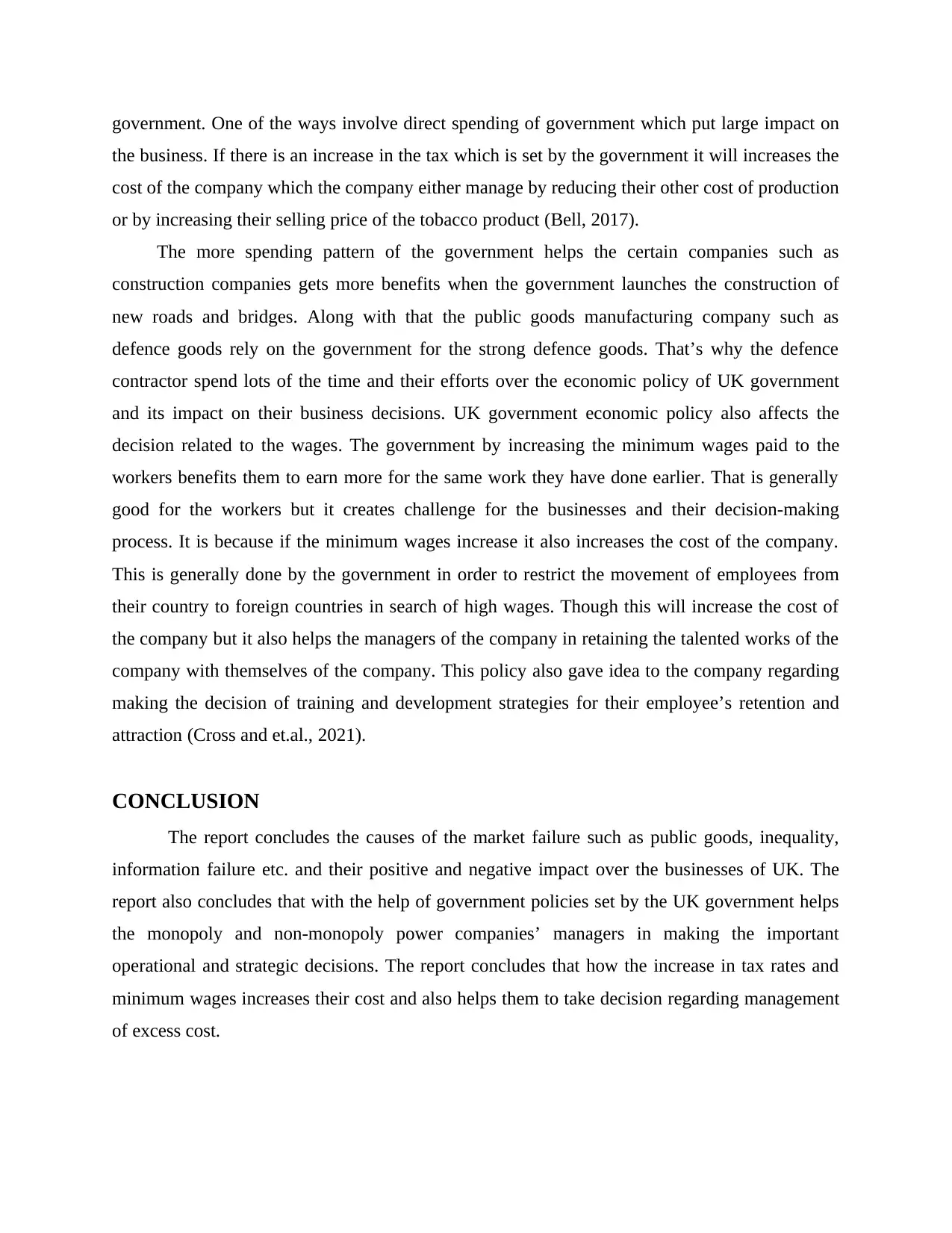
government. One of the ways involve direct spending of government which put large impact on
the business. If there is an increase in the tax which is set by the government it will increases the
cost of the company which the company either manage by reducing their other cost of production
or by increasing their selling price of the tobacco product (Bell, 2017).
The more spending pattern of the government helps the certain companies such as
construction companies gets more benefits when the government launches the construction of
new roads and bridges. Along with that the public goods manufacturing company such as
defence goods rely on the government for the strong defence goods. That’s why the defence
contractor spend lots of the time and their efforts over the economic policy of UK government
and its impact on their business decisions. UK government economic policy also affects the
decision related to the wages. The government by increasing the minimum wages paid to the
workers benefits them to earn more for the same work they have done earlier. That is generally
good for the workers but it creates challenge for the businesses and their decision-making
process. It is because if the minimum wages increase it also increases the cost of the company.
This is generally done by the government in order to restrict the movement of employees from
their country to foreign countries in search of high wages. Though this will increase the cost of
the company but it also helps the managers of the company in retaining the talented works of the
company with themselves of the company. This policy also gave idea to the company regarding
making the decision of training and development strategies for their employee’s retention and
attraction (Cross and et.al., 2021).
CONCLUSION
The report concludes the causes of the market failure such as public goods, inequality,
information failure etc. and their positive and negative impact over the businesses of UK. The
report also concludes that with the help of government policies set by the UK government helps
the monopoly and non-monopoly power companies’ managers in making the important
operational and strategic decisions. The report concludes that how the increase in tax rates and
minimum wages increases their cost and also helps them to take decision regarding management
of excess cost.
the business. If there is an increase in the tax which is set by the government it will increases the
cost of the company which the company either manage by reducing their other cost of production
or by increasing their selling price of the tobacco product (Bell, 2017).
The more spending pattern of the government helps the certain companies such as
construction companies gets more benefits when the government launches the construction of
new roads and bridges. Along with that the public goods manufacturing company such as
defence goods rely on the government for the strong defence goods. That’s why the defence
contractor spend lots of the time and their efforts over the economic policy of UK government
and its impact on their business decisions. UK government economic policy also affects the
decision related to the wages. The government by increasing the minimum wages paid to the
workers benefits them to earn more for the same work they have done earlier. That is generally
good for the workers but it creates challenge for the businesses and their decision-making
process. It is because if the minimum wages increase it also increases the cost of the company.
This is generally done by the government in order to restrict the movement of employees from
their country to foreign countries in search of high wages. Though this will increase the cost of
the company but it also helps the managers of the company in retaining the talented works of the
company with themselves of the company. This policy also gave idea to the company regarding
making the decision of training and development strategies for their employee’s retention and
attraction (Cross and et.al., 2021).
CONCLUSION
The report concludes the causes of the market failure such as public goods, inequality,
information failure etc. and their positive and negative impact over the businesses of UK. The
report also concludes that with the help of government policies set by the UK government helps
the monopoly and non-monopoly power companies’ managers in making the important
operational and strategic decisions. The report concludes that how the increase in tax rates and
minimum wages increases their cost and also helps them to take decision regarding management
of excess cost.
Paraphrase This Document
Need a fresh take? Get an instant paraphrase of this document with our AI Paraphraser

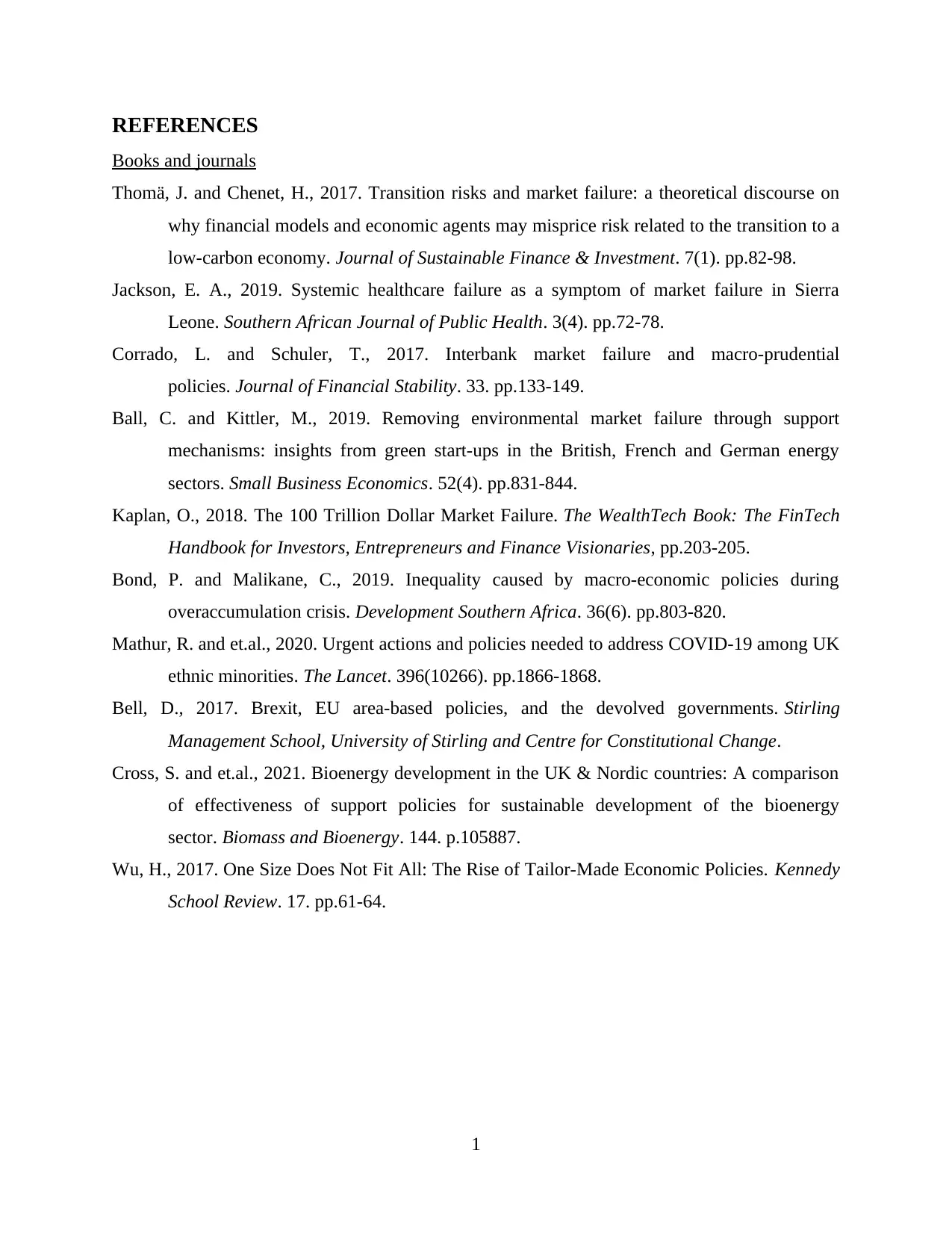
REFERENCES
Books and journals
Thomä, J. and Chenet, H., 2017. Transition risks and market failure: a theoretical discourse on
why financial models and economic agents may misprice risk related to the transition to a
low-carbon economy. Journal of Sustainable Finance & Investment. 7(1). pp.82-98.
Jackson, E. A., 2019. Systemic healthcare failure as a symptom of market failure in Sierra
Leone. Southern African Journal of Public Health. 3(4). pp.72-78.
Corrado, L. and Schuler, T., 2017. Interbank market failure and macro-prudential
policies. Journal of Financial Stability. 33. pp.133-149.
Ball, C. and Kittler, M., 2019. Removing environmental market failure through support
mechanisms: insights from green start-ups in the British, French and German energy
sectors. Small Business Economics. 52(4). pp.831-844.
Kaplan, O., 2018. The 100 Trillion Dollar Market Failure. The WealthTech Book: The FinTech
Handbook for Investors, Entrepreneurs and Finance Visionaries, pp.203-205.
Bond, P. and Malikane, C., 2019. Inequality caused by macro-economic policies during
overaccumulation crisis. Development Southern Africa. 36(6). pp.803-820.
Mathur, R. and et.al., 2020. Urgent actions and policies needed to address COVID-19 among UK
ethnic minorities. The Lancet. 396(10266). pp.1866-1868.
Bell, D., 2017. Brexit, EU area-based policies, and the devolved governments. Stirling
Management School, University of Stirling and Centre for Constitutional Change.
Cross, S. and et.al., 2021. Bioenergy development in the UK & Nordic countries: A comparison
of effectiveness of support policies for sustainable development of the bioenergy
sector. Biomass and Bioenergy. 144. p.105887.
Wu, H., 2017. One Size Does Not Fit All: The Rise of Tailor-Made Economic Policies. Kennedy
School Review. 17. pp.61-64.
1
Books and journals
Thomä, J. and Chenet, H., 2017. Transition risks and market failure: a theoretical discourse on
why financial models and economic agents may misprice risk related to the transition to a
low-carbon economy. Journal of Sustainable Finance & Investment. 7(1). pp.82-98.
Jackson, E. A., 2019. Systemic healthcare failure as a symptom of market failure in Sierra
Leone. Southern African Journal of Public Health. 3(4). pp.72-78.
Corrado, L. and Schuler, T., 2017. Interbank market failure and macro-prudential
policies. Journal of Financial Stability. 33. pp.133-149.
Ball, C. and Kittler, M., 2019. Removing environmental market failure through support
mechanisms: insights from green start-ups in the British, French and German energy
sectors. Small Business Economics. 52(4). pp.831-844.
Kaplan, O., 2018. The 100 Trillion Dollar Market Failure. The WealthTech Book: The FinTech
Handbook for Investors, Entrepreneurs and Finance Visionaries, pp.203-205.
Bond, P. and Malikane, C., 2019. Inequality caused by macro-economic policies during
overaccumulation crisis. Development Southern Africa. 36(6). pp.803-820.
Mathur, R. and et.al., 2020. Urgent actions and policies needed to address COVID-19 among UK
ethnic minorities. The Lancet. 396(10266). pp.1866-1868.
Bell, D., 2017. Brexit, EU area-based policies, and the devolved governments. Stirling
Management School, University of Stirling and Centre for Constitutional Change.
Cross, S. and et.al., 2021. Bioenergy development in the UK & Nordic countries: A comparison
of effectiveness of support policies for sustainable development of the bioenergy
sector. Biomass and Bioenergy. 144. p.105887.
Wu, H., 2017. One Size Does Not Fit All: The Rise of Tailor-Made Economic Policies. Kennedy
School Review. 17. pp.61-64.
1
⊘ This is a preview!⊘
Do you want full access?
Subscribe today to unlock all pages.

Trusted by 1+ million students worldwide

2
1 out of 10
Related Documents
Your All-in-One AI-Powered Toolkit for Academic Success.
+13062052269
info@desklib.com
Available 24*7 on WhatsApp / Email
![[object Object]](/_next/static/media/star-bottom.7253800d.svg)
Unlock your academic potential
Copyright © 2020–2026 A2Z Services. All Rights Reserved. Developed and managed by ZUCOL.



